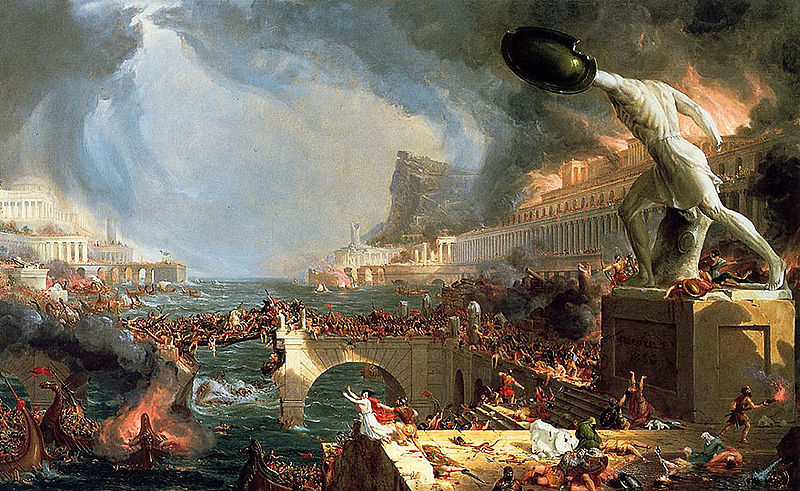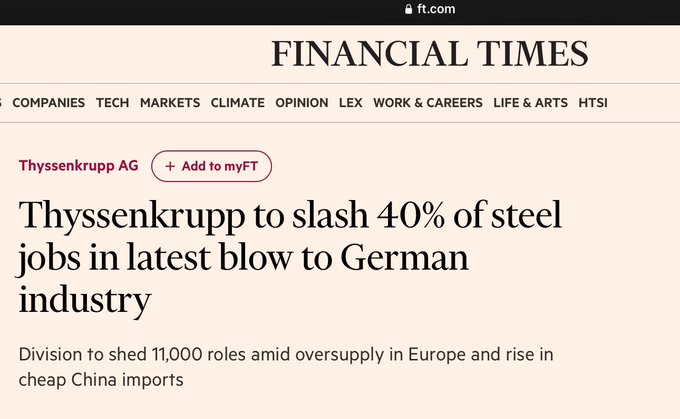
The Course of Empire by Thomas Cole
Not the best of all years. Annus Horriblus.
Gaza: Genocide continues and seems likely to be successful. I’d guess the actual casualties are somewhere north of 700K at this point, they sure aren’t anywhere close to the official numbers. Never again meant nothing.
Hezbollah: Held the Israelis off on the ground, but were devastated by Mossad assassinations and terrorism (the cell phone attack) plus a bombing campaign against civilians they were unwilling to endure. Some signs the war may start up again after the 60 day ceasefire, but without air defense, I don’t think they have it in them to tough it out. Could be wrong.
Syria: I don’t know anyone who expected the Syrian army to collapse the way it did. Israel’s occupied an area about 4X that of Gaza and destroyed most of the Syrian army’s stockpiles, plane and air defenses. Syria’s pretty much defenseless. Some signs of a guerilla war starting against the new “government”. Meanwhile Turkey and its proxies are hammering the Kurds.
Iran: the leadership has proved extremely cautious, though the youngs in the Revolutionary Guard are not and when Khamenei dies, there may be a change in policy. Proved that Israel can’t stop their missile attacks, but unwilling to use them except under extreme provocation and pressure from the youngs. Lost their Syrian ally and Hezbollah has taken hard hits, while the population has lost faith in the system. Not a good year for them.
Russia: continues to grind forward in Ukraine. Economy is doing very well, thanks and they’re now arguably the 4th largest economy in the world, having overtaken Germany. Solid alliance with China. Pretty good year, actually.
Ukraine War: Russia’s winning and all signs are that the Ukrainian army is running out of manpower. Assuming Putin doesn’t accept a peace deal (he shouldn’t, unless Trump offers a better deal than Trump’s likely to offer) I expect the Ukrainian army to collapse in 2025 and the war to go big arrow. Most likely the war will end in a humiliating surrender, perhaps even an unconditional one.
Europe: Industrial collapse, especially in Germany. Germany and France are now ungovernable by either the center-right or left. France is being kicked out of Africa. China is buying fewer and fewer German cars and European goods. America is cannibalizing European industry thanks to lower energy costs. Without a massive turnaround in policy Europe is headed for a massive decline. Wouldn’t expect EU collapse in 2025, but 2026 is possible.
America: Continues its slow decline. Cannibalizing its allies industry to try to sustain itself. Largely unable to create new tech outside of the information sector. Costs are insane, the rabble are getting uppity and Trump is likely to pursue policies better for oligarchs than ordinary people. Loss in Ukraine will be a huge hit to American prestige and power.
Massive eighteen percent increase in homelessness, even as billionaires have doubled their wealth since 2020.
Yemen: The only truly moral nation in the world, as the only one going all out to try and stop a genocide. I don’t like their ideology much, but when they’re the only people standing up, so what?
Anglosphere (Canada, Britain, Australia): experimented with massive immigration and its skyrocked housing and rent and caused massive political instability. Labour and the Canadian Liberals will lose their next elections, but the people who will replace them are Trump-style tards and decline will continue even as looting of the public sector intensifies.
China: Slowing growth but still doing fine, thanks. Massive investment in industry, has taken the lead in about 80% of tech fields, including electric vehicles and drones. Pumping out naval vessels like there’s no tomorrow and has over a 1,000 ICBMs now. Moving up the semiconductor chain far faster than almost anyone (except me) predicted. Eating America and Europe’s lunch in the developing world, since they offer cheaper goods, development and loans without the hypocritcal lectures about human rights.
Generally speaking the decline of the American empire, the rise of a new cold war, the end of neoliberal globalization and the age of revolution and war are all on track as I predicted years ago. Climate change is accelerating, we’re ignoring it and morons are worried about population decline while humanity is in vast population overshoot. This isn’t the worst year of your life, it’s the best year of the rest of your life in geopolitical, economic and ecological terms.
Annus Horribulus will return next year.

